|
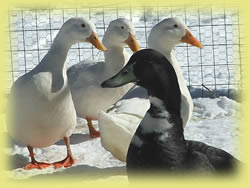
Adoption FAQ:
1) How much is your Adoption Fee?
We ask for a $35 donation per duck or goose to cover our minimum per-bird
vet costs.
2) Do I need to quarantine my newly adopted bird?
No, we have done that all for you! Every bird is
tested for parasites, receives two precautionary
delousing treatments and is quarantined for a minimum of
14 days.
3) Do you ship birds?
We do NOT ship
our rescued ducks and geese.
4) Do you deliver birds to adopting homes?
In the best interests of our waterfowl, we ask that all
adopters residing within 8 hours (one way) of the sanctuary
put in the effort to make
that drive to adopt their new family members.
If an adopting family cannot manage the full trip to our
sanctuary on their own, we will occasionally meet them
part way, but usually not more than halfway.
When available, this service is usually only available during certain times of the year--NEVER in winter.
We rarely offer to drive more than 2-3 hours unless
three or more birds, hard to place birds, or a special
needs bird is being adopted. In addition, the adopting
family must cover our gas/toll expenses and be willing
to make a donation for our efforts because our time is
valuable and it benefits our sanctuary. Suggested donation: $20.00 per hour for the entire
roundtrip.
5) Do I need a pet carrier when I come to adopt my
bird?
Yes!
Please note, cardboard boxes or cardboard carriers are
not acceptable and we will not send our rescues
off to their new homes in one.
Please bring a REAL pet carrier or cage with some nice,
soft bedding, so they will be comfortable for the ride.
Please bring large enough carriers or multiple carriers
if you are adopting more than one bird from us. If you
have any questions about your pet carrier, please ASK us
before you come to pick up your new
feathered friend!
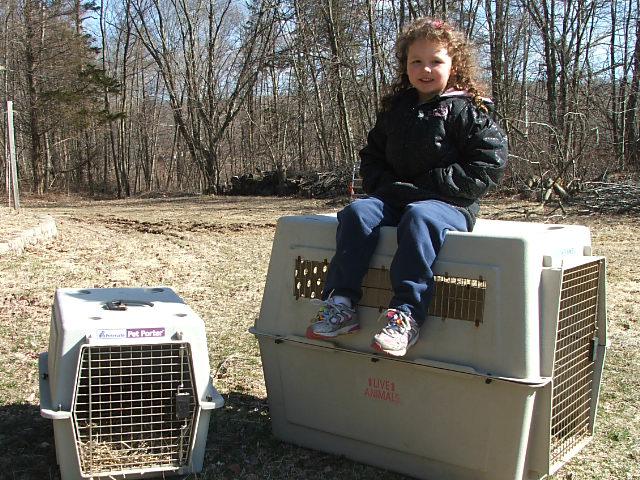
Please
come with a REAL pet carrier!
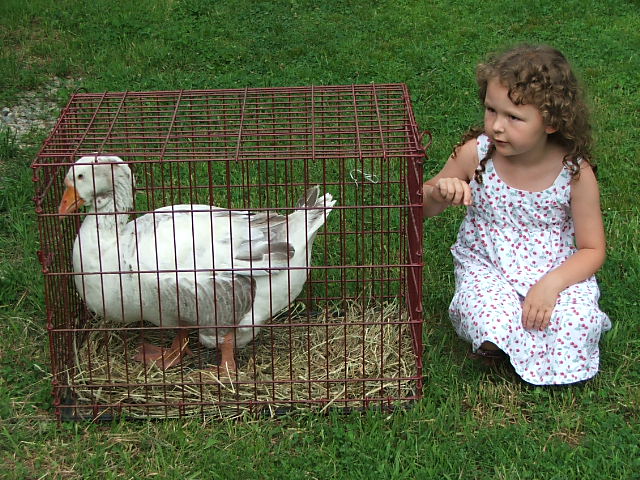
Or a REAL pet cage with some cozy bedding!
6) Does my adopted duck/goose need water or food for
the car trip home?
It is always advisable to provide a water source for
traveling ducks and geese. Occasionally they will get
stressed and vomit in route, and the water will prevent
any choking hazards. Click Here
to learn how to make your own travel-safe, no-spill
water bowl.
Food should be withheld when the duck or goose's entire
trip will take less than 6 hours. This will prevent
vomiting and choking hazards. If the bird's entire trip
will exceed 6 hours than a 1/4 cup of food can be
sprinkled into their water dish every 4-5 hours. You
want to give them enough food to keep their stomach
calm, but do not over-feed as it can lead to carsickness
and vomiting (not to mention more poop!)
NEVER
open your vehicle doors while filling or changing
out food & water bowls! Frightened animals can panic and
flee from your car! Find a rest stop, climb into your
backseat with your newly adopted pet, CLOSE ALL VEHICLE
DOORS AND WINDOWS and then open your pet carrier's door
to attend to your new duck or goose's needs.
7) Is there anything else I need to know about
traveling with my new pet?
Ducks and geese must travel inside of your
vehicle with you--NEVER in an exterior truck bed.
Your new duck or goose has a nice warm feathery
comforter that keeps them toasty warm. Ventilation is
key! In summer, low-to-medium a/c that is not
blowing directly on them will make for a cozy trip. In
winter, keep the heat on low if anything (dress warm!).
In nicer seasons, open windows partway to keep the air
inside fresh and moving. This will help prevent car
sickness, stress and vomiting.
8) Where can I view your adoption contract?
Click Adoption Contract.
9) Where can I learn more about waterfowl care?
You can review our
Archived Newsletters and sign up for our
E-list. You can also
purchase The Ultimate Pet Duck Guidebook & The Ultimate
Pet Goose Guidebook written by our
very own Founder & President!
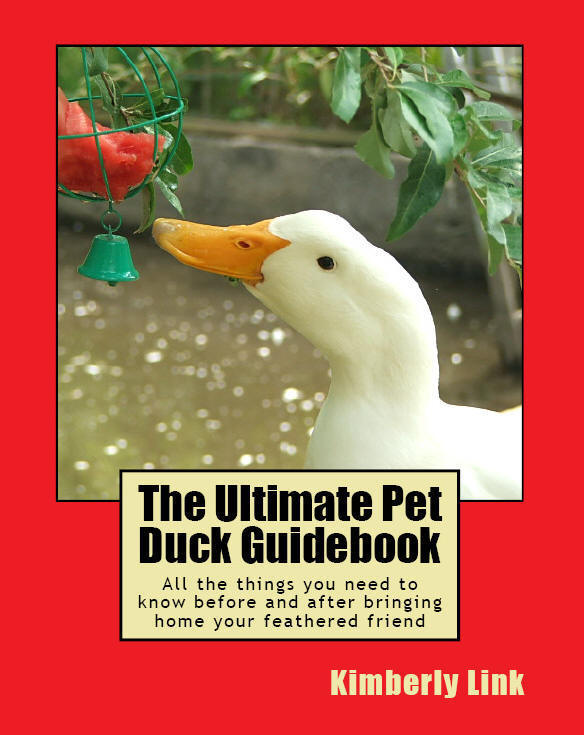
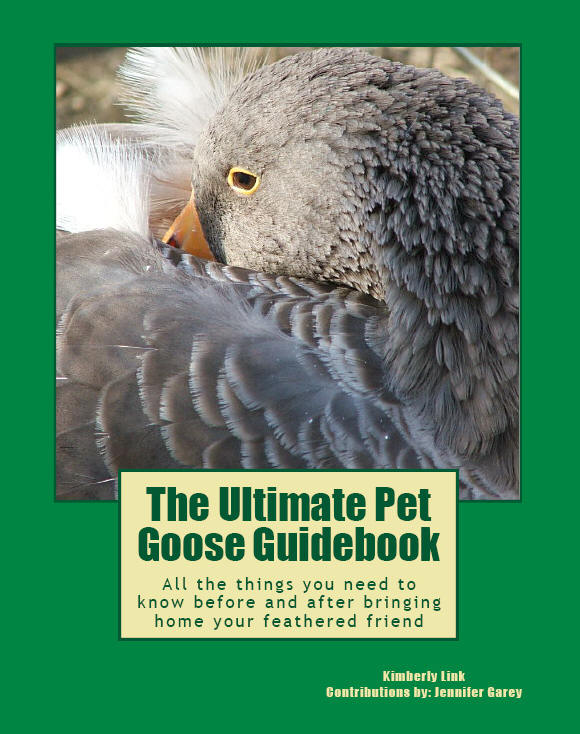
 Click Here for more
information & Coupon codes!
Click Here for more
information & Coupon codes!

10) Are your adoptable animal profiles up to date?
ALWAYS! If their photo is on our website, the duck or
goose is HERE! Profiles are added the SAME DAY new
animals arrive. Profiles are removed the SAME DAY
animals are adopted. Any birds in the midst of an
adoption procedure will be clearly notated.
11) Do you "hold" adoptable animals for interested
adopters?
We will sometimes agree to hold birds for up to 7
days if Adoption Fees are paid in advance by an approved
home. Should the adoption fall through or become delayed
for any reason whatsoever, the Adoption
Fees will be considered entirely forfeit and completely
non-refundable. In addition, the bird(s) will be
immediately re-listed as adoptable.
12) Where are you located?
Our sanctuary is located at: 17 Barker Road, Lebanon, Connecticut
06249.
If you have a scheduled appointment and
do not have a GPS be sure you have a good street map for
the last few miles of the journey. Most people find us
without difficulty, but a few get lost within 1-2 miles
of our sanctuary. We have very poor cell reception here,
so be sure you have good directions with you.
Interactive Map:
View Larger Map
13) Can I come and meet your adoptable ducks and
geese?
If you have filled out our online adoption
application and we have pre-approved your family for adoption, you
can schedule an appointment to visit our sanctuary and
meet our rescued ducks and geese. No Visiting Donations
are required from our potential adopters, but please
click on
Sanctuary Visits
for further details.
14) Can I come visit the sanctuary even if I'm not
planning to adopt a duck or goose?
Time and weather permitting, we do give private
sanctuary tours, but we ask for a Visiting Donation for
this service. To learn more, click on
Sanctuary Visits.
15) I would like to learn more about building a safe
waterfowl enclosure. Is there a charge for this kind of
visit?
Unless you are pre-approved for adoption, we ask all
of our sanctuary visitors to make a Visiting Donation of
at least $10.00 per person. Like yours, our time is very
valuable and your donation goes directly to the ducks
and geese in our care. To learn more, click on
Sanctuary Visits.
To learn more about pen construction and materials
via our website
Click Here.
Requirements for Adoption
We ask many things from adopters and
that is because we are trying to place our ducks and
geese in the best possible homes. Before rushing to fill
out an adoption application, please take a moment to
consider the following:
1) Do you know how to care for the
duck or goose you wish to adopt? We ask our
adopters to please Sign Up
for our e-list to receive our monthly newsletter
that contains detailed health & care information
you won't find anywhere else. We also maintain
an
Online Newsletter
Archive where we store prior newsletters for your
convenience. You can also view a list of helpful
books by clicking here.
2) Ducks and geese require a
Predator Proof Pen! We cannot stress this
enough. Their lives depend on a well built,
predator-proof enclosure and a night time lock up. We do not adopt out our rescues to homes
intending to free range or to homes with little circles
of chicken wire staked into the ground. In addition, ducks and geese must be CLOSELY
and CONTINUALLY chaperoned by a responsible adult any
time they leave their pen.
3) Ducks and geese require actual
brand-name Waterfowl Feed (as opposed to cracked corn,
chicken scratch or other non-sustaining diets). They also need
drinking water and some kind of swimming water that can
range from a kiddie pool to a fenced in pond.
4) Despite what many sources will
say, ducks and geese are not "low maintenance"
pets. Like any other pet, they thrive on
interaction and companionship. Ducks and geese
are not once-a-day, five minute pets. You
should count on spending a minimum of 15 minutes with them in
the morning, setting them up for the day and
then at
least an hour with them every evening.
5) Ducks and geese poop A
LOT! The hay in their houses will need
to be refreshed daily, covering up the messy
spots. Buildings/sheds will need to be
thoroughly cleaned on a regular basis to prevent
the outbreak of parasites, health issues and disease among your
flock.
6) You need to regularly inspect
your waterfowl pen to ensure that the smallest
of predators (weasels) to the largest of
predators (dogs) can't get in. Flying, climbing,
digging, jumping predators will take your ducks
and geese and keep coming back for more. This includes
cats, dogs, coyotes, bobcats, fisher cats,
weasels, hawks, eagles, owls, fox and raccoons.
Ducks and geese should be locked up from dusk
'til dawn when these predators are most active.
7) Do you go on vacation? Finding a
reliable waterfowl sitter can be extremely
difficult. We cannot stress the importance of
this. We continually hear about pet-sitters who
did not show up on time in the evening,
resulting in lost birds. Predators are diligent.
They know where your ducks and geese are, and
they watch and wait patiently for just the right
opportunity. A late pet-sitter is just that
opportunity. It only takes one mistake to lose
your pet. Majestic offers zero-deposit,
discounted
pet-sitting services to help our adopters meet this need!
8) Ducks can live up to 15
years (some go as high as 20!) if they are protected from predators,
cared for properly and maintained on a healthy
diet.
9) Geese can live up to 30 years if they are protected from
predators, cared for properly and maintained on
a healthy diet.
10) If you already have ducks
or geese, have you considered how they will react to a
new duck or goose in their flock? Geese do well in
evenly matched male/female pairs. Ducks are different
than geese. If you are not maintaining an all female or
all male flock and you do not have more than one pen to
provide for drake separations, you will need to
maintain a ratio of 1 drake (male) for every 3-4 hens
in order to prevent fighting and over-mating
issues (that can be fatal).
11) If you have other pets, like
cats and dogs, have you considered the danger
they may impose on your newly adopted ducks or
geese? The leading cause of death to
domestic waterfowl is from predator attack. Are
you aware that almost all dogs (even the most
gentle of household pets) have an innate
instinct to chase and even kill birds?
12) Are all family members in
agreement about adopting a duck or goose?
13) Have you researched town or city
ordinances to make sure you are allowed to keep
waterfowl? (Many towns and cities prohibit the
keeping of waterfowl).
14) One of the most common causes of
death in waterfowl (second to predatory attack)
is hardware disease. Ducks and geese are
attacked to metal objects, especially shiny
ones. When they ingest foreign
objects such as nails, wire, coins, tin foil,
fishing lures, etc. they succumb from metal
toxicity. Death
occurs in almost all cases. Are you able to keep
your duck or goose's enclosure free of such
items?
15) Ducks and geese hide their
ailments for as long as they can. This is a defense mechanism that
helps to protect them against predatory attacks.
This means that by the time you notice your duck
or goose acting differently, their illness tends
to already be progressed. Do you have a reliable
waterfowl vet? Not all avian vets treat ducks
and geese, so you will need to find someone who
will treat them before you adopt. Keep in mind pets tend to
get sick after hours and on weekends. Be sure to
find an emergency vet who can assist during
these off times. For a listing of waterfowl vets
we know of Click Here.
16) Vet care is expensive. Are you
willing and capable to spend the money needed to
properly care for your duck or goose?
17) Ducks and geese are flock
animals and are happiest in the company of
friends. If adopting a duck or goose, you will
need to have at least one companion for them. If
you don't already have a duck or goose at home,
we will require that you adopt a pair.
18) Are you a home owner? We do not
adopt to families who rent or lease. Landlords and
neighbors can be fickle. If you have to move, you may not
be able to find another place that will welcome your
feathered friends.
19) Are you 18 years or older? We do
not adopt to minors. Please have your parents
fill out our adoption application.
All Adopters Must Be Prepared To:
1) Provide a proper diet for your
duck or goose that is specifically designed for
waterfowl. We highly recommend Mazuri Waterfowl
feed. Click Here for more
information or to view other quality brand options.
2) Make fresh, clean water
available to your duck or goose at all times.
3) Supply a bathing source for your
duck or goose that is cleaned on a regular
basis.
4) Keep straw and bedding fresh and
clean.
5) Enclose your duck or goose in a
predator-proof structure that provides
protection from direct sun or bad weather
(snow, hail, rain, hurricane, etc.).
6) Lock up your duck or goose every
evening before sundown in an enclosure that is
completely
predator proof (often a barn, shed or house of
some kind).
7) Locate the closest veterinarian
that has experience with waterfowl and list
their full information on your adoption
application and be fully prepared to pay for any
vet treatment your duck or goose requires--no
home remedies!
8) Provide us with photos of the
outdoor enclosure that the duck or goose will be
staying in during the day as well as photos of
the nighttime housing, both inside and out.
9) Be willing to let us perform an
onsite inspection, provided you reside within
our standards of reasonable driving distance.
10) Pay an adoption fee of $35 per duck
or goose. This fee cannot be waived. It covers
the cost we pay for each bird's fecal exam when they
arrive at our sanctuary.
11) 95% of all of our adopting
families come to our site in Connecticut
to adopt. We occasionally make
exceptions and split the drive; in this case the
adopting family must cover all of our traveling expenses
in addition to paying the adoption fee. We do not ship
our rescues.
12) Read and sign an
Adoption
Contract. The
Adoption Contract is your legal
promise to provide proper care and enrichment of
the waterfowl you adopt from us for the rest of
their natural lives. In the event that you no
longer can provide a suitable home or proper
care for the waterfowl, you will agree to
relinquish the waterfowl directly back to our
sanctuary--you are not permitted to find a new home for them on your own.
How To Start The Adoption Process
Look through the
Adoption Profiles Pages to see if there is one (or
more!) you would like to adopt. Then to start the adoption process you
will need
to fill out our
Online Adoption
Application. You will then need
to send us photographs of your enclosure, following the
instructions at the end of the Online Adoption
Application. You
will receive an email confirmation within three
business days of receipt of your application. After
reviewing your application, we may have a few questions
for you. Questions are commonly asked and addressed via
email exchange. When necessary, we will follow up these
actions with a phone interview. Phone calls are done at
the adopting families expense. An appointment will be
scheduled and adopters will be required to call
accordingly. If you
are approved for adoption, you will need to come to our
site in Connecticut to pick up the ducks or geese, sign
our Adoption
Contract and pay any related adoption fees.
Learn More...
© Majestic
Waterfowl Sanctuary 2005, 2006, 2007, 2008, 2009, 2015 |

